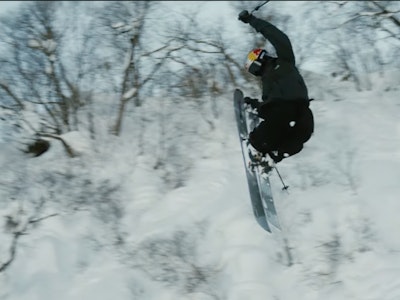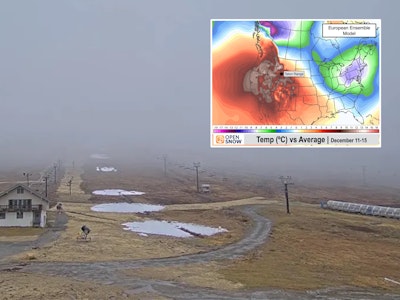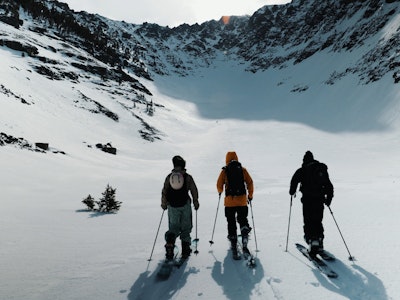As seen in January 2012 issue of Freeskier. Words by Cody Townsend.
I didn’t know I could travel in time until the day I stared straight down to my death. The first thing that caught my eye as I left the edge of a seventy-foot cliff in Terrace, British Columbia, was a massive pile of rocks. Right in the landing. My trajectory put me on a potentially deadly collision course ending nearly six stories below. But instead of being overrun with panic and terror, something strange happened. An eerie calm washed over my body and my mind went into a hyperacute state, detatched but keenly absorbing every detail, every inch of snow and every jagged edge of the rusty-toned rocks below.
A rapid internal dialogue paced through my head. In real time the internal conversation took place within fractions of a second, but in my mind it played out like an afternoon chitchat over tea.
“Well, I guess I’m gonna land on those rocks. Yup, definitely don’t think I’ll be able to clear them. Well, just try to land it on top of them. Going pretty damn fast. Seems like I might be able to pull it though. I hope this doesn’t freak out the camera guys.”
My fixed course to ruin felt as casual as hitting the pause button in a video game. Everything that played out in my head during those moments before impact went against every conventional predeath instinct I could ever imagine.
After one knee surgery and two months on the couch had passed, the crash still played in my head like a skipping CD. Sure, jumping off cliffs in the past has produced similar slow-mo sensations but nothing compared to the tranquil, time-stopping, hyperaware state I fell into on this crash. I had to know why. Why did my brain act so counterintuitively, trading panic for serenity and acceleration for deceleration? Little did I know, a chance encounter with the work of a brash genius and a dive into ancient Asian philosophy would provide possible answers.
So as you’ve probably gathered by now, I didn’t end up dying, otherwise I wouldn’t be writing this. But something happened in my mind that was very akin to those last moments of life described by others who have had near-death experiences. According to David Eagleman, a neuroscientist out of the Baylor College of Medicine, my brain instinctively knew I was in a life-threatening situation and the byproduct of that situation is something he has been obsessed with since a similar experience of his own.
As a young boy, Eagleman fell off the roof of his home in Albuquerque, New Mexico. As he fell, he experienced a moment of total relaxation and sharp mental focus. His fascination with that sensation carried from boyhood to his doctorate and has since led him to research how the brain reacts in those sorts of life-threatening situations.
From dropping unexpecting people back-first from hundreds of feet up into giant nets to fMRI studies done on roller coasters, Eagleman’s research is unconventional but has yielded some interesting results. In a recent New Yorker interview, Eagleman said, “Time is this rubbery thing, it stretches out when you really turn your brain resources on, and when you say, ‘Oh, I got this, everything is as expected,’ it shrinks up.” In fact, the brain begins to stretch time so much that his subjects, on average, estimate their death-defying falls to be 36 percent longer than they really are.
While Eagleman’s subjects have not shown additional comprehension at the hands of a slowed-down reality, he says that our brains work on sort of a tape-delayed broadcast of comprehension. “Living in the past may seem like a disadvantage, it’s a cost that the brain is willing to pay,” Eagleman says. “It’s trying to put together the best possible story about what’s going on in the world, and that takes time.”
While the science is starting to support stories like mine, it’s something Japanese swordsmen have already known for centuries. Coming from the term mushin no shin—mind without mind—and related to the teachings of Zen Buddhism, mushin is a concept that essentially allows a person to discard thought and judgment in order to react only on sensory intuition. Takuan Soho, a 16th-century figure of Zen Buddhism, wrote in The Unfettered Mind, “When this No-Mind has been well developed, the mind does not stop with one thing nor does it lack any one thing. It appears appropriately when facing a time of need.” This No-Mind state is something that Japanese masters of the martial arts have studied, practiced and taught for centuries because in a sword fight, an unsound mind could mean the difference between life and death.
As I reflect, six months after my crash, perhaps what made the difference between me not being here today and what actually happened was the mind’s power to slow time by a third and go into a mushin state to generate an instinctual survival reaction in a life and death circumstance. Perhaps one day, the wisdom of ancient philosophy and the research of modern science will let us all know.

![[GIVEAWAY] Win a Head-to-Toe Ski Setup from IFSA](https://www.datocms-assets.com/163516/1765920344-ifsa.jpg?w=200&h=200&fit=crop)


![[GIVEAWAY] Win a Legendary Ski Trip with Icelantic's Road to the Rocks](https://www.datocms-assets.com/163516/1765233064-r2r26_freeskier_leaderboard1.jpg?auto=format&w=400&h=300&fit=crop&crop=faces,entropy)




![[GIVEAWAY] Win a Head-to-Toe Ski Setup from IFSA](https://www.datocms-assets.com/163516/1765920344-ifsa.jpg?auto=format&w=400&h=300&fit=crop&crop=faces,entropy)

